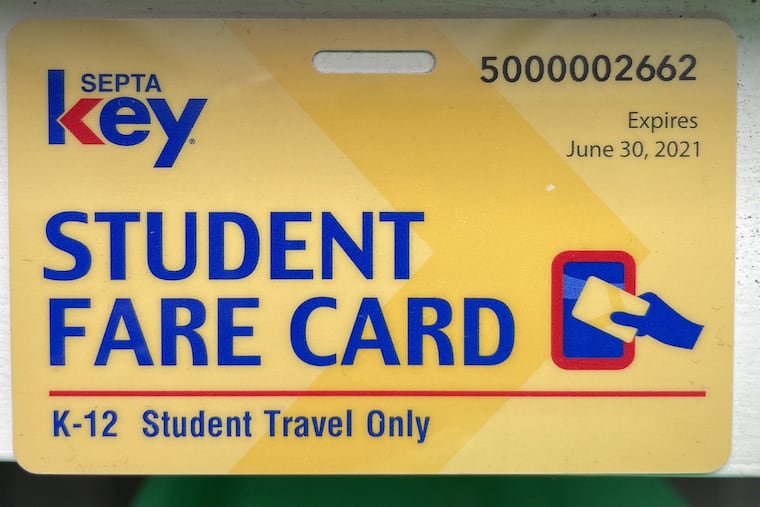For Philly students who ride SEPTA, ‘a major upgrade’ coming when school starts
Students will have one contactless card for the whole year, valid Monday through Friday from 5:30 a.m. to 8 p.m. Schools will have the ability to replace lost or damaged cards.

For the 65,000 Philadelphia students who get free SEPTA rides to school, a major change is coming.
Gone are the old weekly TransPasses. Coming are contactless “Student Fare Cards,” based on SEPTA’s Key Card.
Students will have one card for the whole year, valid Monday through Friday from 5:30 a.m. to 8 p.m., a nod to those students who participate in extracurricular activities. The Student Fare Cards will not work on school holidays and will be valid for up to eight rides a day on buses, trolleys, and subways.
Regional Rail rides are not covered on the Student Fare Card, but students can pay to add them to the card.
“It’s a major upgrade from the weekly TransPasses that students have used previously,” Leslie Richards, SEPTA general manager, said of the new Student Fare Card at a news conference Thursday.
Students in any Philadelphia School District, charter, or private school in grades 7 through 12 who are eligible for free transportation will get the new cards on the first day of school. The district’s first day of classes is scheduled for Aug. 31.
“This relieves a tremendous burden that was placed on schools administratively to distribute [the old weekly passes] each Monday,” Philadelphia Superintendent William R. Hite Jr. said. “We’re thrilled that it starts on the first day a child returns to school and it’s there. That in and of itself is a magnificent upgrade.”
The upgrade, years in the making, will not cost the school system anything; it will continue to get reimbursed for transportation costs by the state. SEPTA, however, has taken on additional costs to make the school upgrade happen for its smart fare system, whose price tag is now an estimated $200 million.
Michael Carroll, the city’s deputy managing director for transportation, infrastructure, and sustainability, said having schools reopened and children on public transportation to get there will be a key part of Philadelphia’s recovery from the pandemic.
“We know transit is always going to be part of the solution,” Carroll said.
Richards said SEPTA’s fleet will be ready for the increased ridership when school begins. The agency is “continuing with our enhanced cleaning efforts, and that is on all of our vehicles and at all of our stations,” she said. It has also upgraded air filters on its vehicles; air recirculates every two to three minutes, more frequently than operating rooms, Richards said.
SEPTA riders, including students, must still wear masks on all platforms and vehicles.
Hite said that’s the plan for students returning to classes, too.
“At the moment, we are currently requiring masks” for the fall, the superintendent said, adding that he’s awaiting further guidance from the Centers for Disease Control and Prevention about school spacing. The CDC is still recommending three feet of spacing between students, which would pose a problem for the district’s plan to return to five full days of in-person instruction. Some district buildings are too small or crowded to allow for all students to be in rooms with three feet of spacing.
» READ MORE: Every kid in Pa. has the right to a school year ‘do over.’ But if families want that, they have to act fast.
Hite said the district will work to publicize Act 66, a recently enacted Pennsylvania law that allows every student enrolled in school last year to repeat a grade because of COVID-19 learning losses. The legislation also gives students with disabilities who turned 21 during the school year the right to remain in school for another year.
Families have until July 15, a state-set deadline, to notify schools of their intent to have children repeat a grade or stay for the extra year if they’re a 21-year-old with disabilities. Hite encouraged families to reach out to schools with questions about their child’s individual readiness — though teachers have off all summer and many principals take time off in July.
“Naturally, no one wants to see large numbers of students retained,” Hite said, adding that the district wants people to have as much information as possible.
It’s too soon to say the logistical or financial impact of Act 66 to the district, the superintendent said.